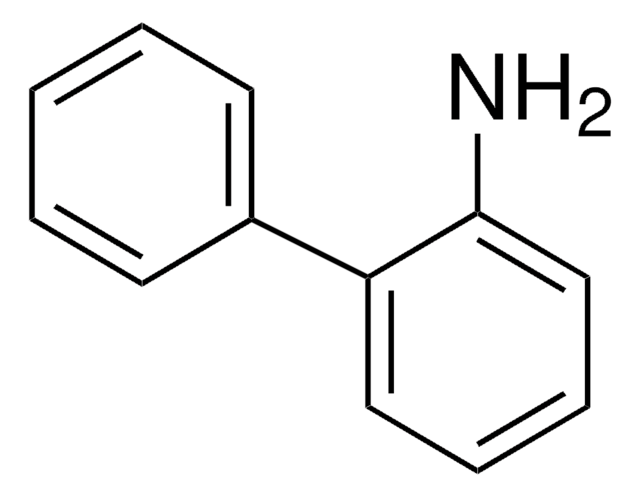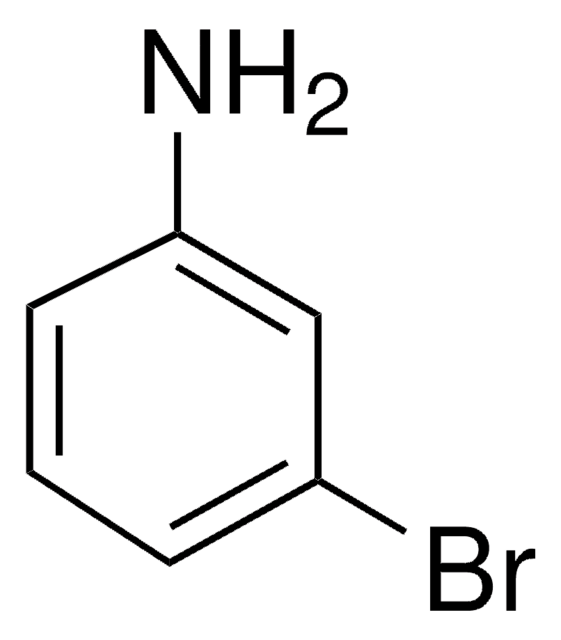716448
3-Aminobiphenyl
97%
Anmeldenzur Ansicht organisationsspezifischer und vertraglich vereinbarter Preise
Alle Fotos(1)
About This Item
Empirische Formel (Hill-System):
C12H11N
CAS-Nummer:
Molekulargewicht:
169.22
MDL-Nummer:
UNSPSC-Code:
12352100
PubChem Substanz-ID:
NACRES:
NA.22
Empfohlene Produkte
Qualitätsniveau
Assay
97%
Form
solid
mp (Schmelzpunkt)
28-33 °C
Funktionelle Gruppe
phenyl
SMILES String
Nc1cccc(c1)-c2ccccc2
InChI
1S/C12H11N/c13-12-8-4-7-11(9-12)10-5-2-1-3-6-10/h1-9H,13H2
InChIKey
MUNOBADFTHUUFG-UHFFFAOYSA-N
Signalwort
Warning
H-Sätze
Gefahreneinstufungen
Acute Tox. 4 Oral - Eye Irrit. 2 - Skin Irrit. 2 - STOT SE 3
Zielorgane
Respiratory system
Lagerklassenschlüssel
11 - Combustible Solids
WGK
WGK 3
Flammpunkt (°F)
>230.0 °F - closed cup
Flammpunkt (°C)
> 110 °C - closed cup
Hier finden Sie alle aktuellen Versionen:
Besitzen Sie dieses Produkt bereits?
In der Dokumentenbibliothek finden Sie die Dokumentation zu den Produkten, die Sie kürzlich erworben haben.
M Maclure et al.
American journal of public health, 79(10), 1381-1384 (1989-10-01)
The hypothesis that involuntary exposure to tobacco smoke--passive smoking--results in greater risk of cancer was assessed by measuring the levels of two known carcinogens in the blood of 57 nonsmokers with varying degrees of involuntary exposure, including six heavily exposed
J W Gorrod et al.
Anticancer research, 6(4), 729-731 (1986-07-01)
The metabolism of 3-aminobiphenyl (3-ABP) and 3-acetamidobiphenyl (3-AABP) has been studied using fortified rat liver microsomal preparations. Metabolites in concentrates of ether extracts from hepatic microsomal preparations were analysed by TLC and GLC. The metabolites were characterised by a comparison
J Esteban Castelao et al.
International journal of cancer, 110(3), 417-423 (2004-04-20)
Previous epidemiological studies of fruit and vegetable intake and bladder cancer risk have yielded inconsistent results, especially with respect to the role of cigarette smoking as a possible modifier of the diet-bladder cancer association. A population-based case-control study was conducted
M Kajbaf et al.
European journal of drug metabolism and pharmacokinetics, 12(4), 285-290 (1987-10-01)
[14C] 2-Aminobiphenyl is predominantly metabolised in vivo to 3- and 5-hydroxy conjugated derivatives in all species. In some species, 2-aminobiphenyl is also excreted to a small extent as N-conjugated derivatives. Renal excretion accounts for about 30-40% of the administered dose
G Ronco et al.
British journal of cancer, 61(4), 534-537 (1990-04-01)
In a previous study we found that aromatic amines, particularly 4-aminobiphenyl, formed haemoglobin adducts at higher concentrations in the blood of smokers compared to non-smokers. We re-analyse here data on haemoglobin adducts of 14 aromatic amines in order to ascertain
Unser Team von Wissenschaftlern verfügt über Erfahrung in allen Forschungsbereichen einschließlich Life Science, Materialwissenschaften, chemischer Synthese, Chromatographie, Analytik und vielen mehr..
Setzen Sie sich mit dem technischen Dienst in Verbindung.![[Pd(OAc)2]3 reagent grade, 98%](/deepweb/assets/sigmaaldrich/product/structures/508/249/99a0ef2c-b77c-4d73-8ed9-0cca05b6b41f/640/99a0ef2c-b77c-4d73-8ed9-0cca05b6b41f.png)









